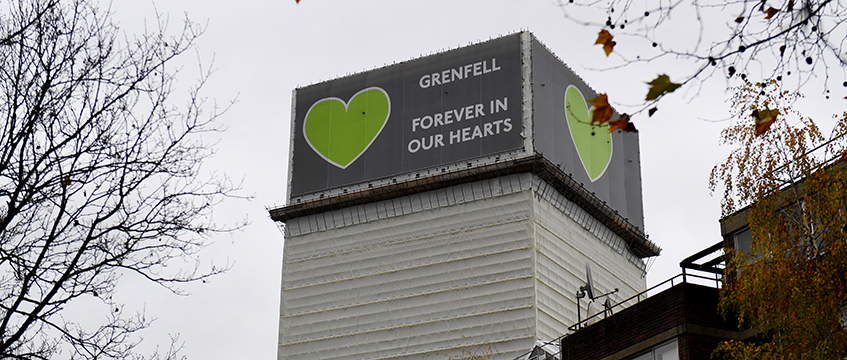The real estate industry has reacted to the release of the Grenfell Tower Inquiry Phase 2 report earlier today.
The report is the conclusion to the inquiry launched after the 2017 fire that claimed the lives of 72 residents. It was chaired by Sir Martin Moore-Bick and comprises recommendations from a panel including architect Thouria Istephan and housing expert Ali Akbor.
It highlighted a history of complacency and defensiveness within government departments towards safety, and advocated a fresh approach to reviewing and revising Building Regulations, emphasising that safety should be the primary consideration.
The property sector is now asking what further steps need to be taken.
Ian Fletcher, director of policy at the British Property Federation, said: “Today marks merely another staging point in a heart-wrenching human tragedy. The results of the inquiry illustrate in graphic detail the systemic failure that Dame Judith Hackitt identified in the aftermath of the fire.
“In the years since Grenfell, important steps have been taken to prevent a similar tragedy occurring in the future. The building safety regime for higher-risk buildings clearly sets out the requirements for new and existing construction work, which clients in the sector are carefully following.
“As the report, however, exposes, another conclusion of Dame Judith’s was that the culture of the construction sector must change, and it is under close scrutiny to do so.
“Progress has been made, but more needs to be done, and clients can play their part in that. Today is not the day to get into the detail of the report recommendations, but on the face of it many seem appropriate, and will have our support.”
Mary Lawrence, head of health and safety at law firm Osborne Clarke, said the Building Safety Act 2022’s “effectiveness in reducing risks is yet to be seen”.
She said: “In the real estate sector, where ownership and responsibility issues are complex, it is extremely important for there to be clear accountability in roles and responsibilities around coordination.”
Lawrence added: “The Building Safety Act is having an impact on driving change in the industry, with parties involved in the ownership and operation of higher-risk buildings having new legal duties around accountability and risk management which are a wholesale change from the position at the time of the Grenfell tragedy.
“However, it clearly remains to be seen whether this is enough, and today’s report suggests that more may need to be done to drive change in safety behaviours and culture in the industry.”
David Savage, partner at law firm Charles Russell Speechlys, said: “It is interesting and noticeable that Sir Keir Starmer has referenced the idea of personal evacuation plans, as these have previously not been taken forward under either the Fire Safety Act 2021 or the Building Safety Act 2022.
“On first look, the focus on the ethical shortcomings of the construction product manufacturers in the report is very striking, especially given the lack of their involvement in funding remedial works to date. In that context, it is also important to acknowledge the distinction between construction industry failings that can be attributed to ‘incompetence’ as opposed to those that flowed from ‘dishonesty and greed’.
“This report, as with its predecessor, is a vital read for the wider construction sector, politicians and businesses more broadly, asking what must be done to ensure such a tragedy can never happen again.”
With regard to further regulation from the government, Andrew Parker, head of the construction disputes and building safety practices at law firm Forsters, said: “A key finding is that government was given plenty of warning as far back as 1991 of the risks of combustible cladding panels and insulation, particularly on higher-rise buildings, and so had opportunities to take action but failed to do so.
“The arrangements for procuring works to higher-risk buildings have been found to be deficient. There is a clear message that the way key members of the construction industry have been regulated and trained needs to change, and guidance provided by government for compliance with the relevant legislation needs to be improved.
“Regulation of the construction industry has become too complex and fragmented.”
Asked what the real estate sector needs to keep in mind following the inquiry, Shaun Lundy, quality assurance and strategy director at Tetra Consulting, said: “Real estate developers, owners and managers should ensure that fire safety strategies are not only in place but are comprehensive and regularly updated.
“Fire risk assessors and engineers will in the future need to be properly accredited, and there should be a clear focus on maintaining high standards of competence across the board. The implementation of personal emergency evacuation plans for vulnerable residents will be a challenging requirement to implement for those responsible for managing buildings.
“Additionally, compliance with Building Regulations should be seen as a minimum standard, not the end goal. The real estate sector should aim to exceed these standards wherever possible to safeguard lives and meet more stringent regulatory standards.”
Lundy added: “As we move forward, it is imperative that the real estate industry embraces a culture of safety, continuous improvement and accountability. This includes staying informed about regulatory changes, participating in ongoing education and training, and collaborating with fire and building safety professionals to ensure buildings are safe for all occupants.
“By taking these steps, the real estate industry can help prevent future tragedies and build trust with the public.”
Photo © James Veysey/Shutterstock
Send feedback to Akanksha Soni
Follow Estates Gazette











